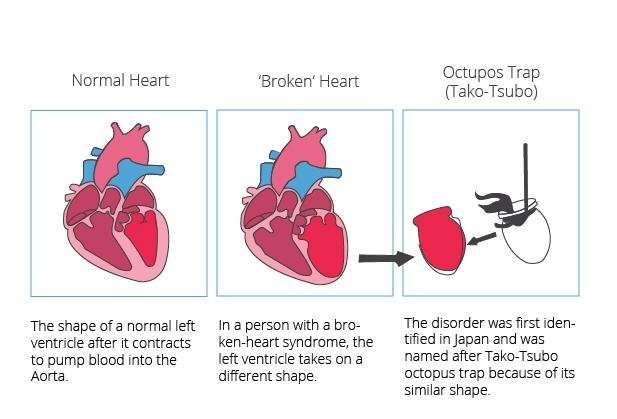
Many of us can probably relate to someone that just got blindsided and broken up with the person they thought was “the one”. They often get into some form of emotional shock or life crisis; barely getting out of bed, feeling and often looking miserable, spending hours of their day crying and moping around and most likely, their work and social life begins to slip. It’s almost like they are literally going to die from a “broken heart”.
There are also scenarios where longtime married couples that have been together for decades, die within just a few days of each other. A tragedy or a love story?
Losing a loved one can be emotionally devastating. But, the most important question is how this emotional despair affects our health and our heart.
As extreme as it sounds, feeling broken hearted sucks. But are you being overly melodramatic when equating the connection of deep emotional pain with real physical pain or is there some truth to it?
Well, it’s actually possible to suffer from a real broken heart. Unfortunately, in some cases, a bad break up or losing someone very close to your heart can cause enough emotional trauma and stress that it will actually cause real physical damage to one’s actual heart. This is recognized in the medical field as a real phenomenon known as the “broken heart syndrome”.
According to Dr. Martin Murage – Head of Cardiology Department – KNH, Broken heart syndrome, though rare is a temporary heart condition that’s often brought on by an automatic stressful emotional experience such as grief in most cases.
“People who are experiencing broken heart syndrome describe sudden heart attack-like symptoms that include chest pain and difficulty breathing. In some cases, it can be misdiagnosed as heart attack since test results will show changes in rhythm and rising troponin levels consistent with a heart attack. But, unlike a myocardial infarction, other tests will not show blocked arteries. During Broken Heart Syndrome, the left ventricle will temporarily enlarge and does not pump enough blood. The remainder of the heart will function normally and may even contract more forcefully trying to make up for poor function in the left ventricle.” he added.
Events that have been known to trigger broken heart syndrome include: Car or other accident, Asthma attack, serious illness, surgery or medical procedure, death or serious illness or injury to a loved one, domestic violence, financial loss, intense fear, sudden surprise or even loss of a job.
It can also be triggered by a difficult breakup, a long physical separation from a loved one, an act of strong betrayal or a romantic rejection. All of these examples have some sort of a negative emotional or physical connotation to it.
“The syndrome can lead to severe, short-term heart failure. Most will make a full recovery within several weeks. However, there is no standard treatment. Instead, clinicians depend on other symptoms, such as arrhythmia (condition characterized by abnormal heart rhythm) to determine treatment options.” said Dr. Murage
Another name for broken heart syndrome is ‘Takotsubo cardiomyopathy’. The word ‘takotsubo’ was derived from the name for a pot used by Japanese fishermen to trap octopuses. When the left ventricle of the heart changes shape, it develops a narrow neck and a round bottom making it looks similar to the octopus trap just like the pot-like shape of the stunned heart in broken heart syndrome as depicted below:

This drew attention from scientists in the West who later named the condition broken heart syndrome in reference to those who experience the condition after the death of a loved one. It is key to note, after the spread of COVID-19, the prevalence of depression, anxiety and stress and the general population rose significantly.
Surprisingly, this syndrome can even happen in people who are considered very healthy and have no previous history of any cardiovascular or heart disease as this is the case for majority of people suffering from broken heart syndrome; Individuals that go the majority of their life with a perfectly healthy heart, but then after experiencing a very specific stressful event they then all of a sudden suffer from symptoms of massive heart attack or even go into complete heart failure.
“In general, menopausal women women are much more likely to suffer from broken heart syndrome. Actually, more than 90% of the reported cases occur in women ages 58 to 75 as they are more susceptible to this condition due to reduced levels of estrogen after menopause” Dr. Murage stated.
Fortunately, for the majority of cases, broken heart syndrome is usually only temporary and most people are able to fully recover within just weeks. And although death from a “broken heart” is extremely rare, it’s still possible in some cases.
“It can cause irregular heartbeats that will eventually lead to cardiogenic shock – when the heart is suddenly dramatically weakened and is unable to pump enough blood throughout the body to meet its needs to function normally. This shock to the body is dangerous and without immediate treatment it can be fatal. It’s also the most common cause of death when one dies from a heart attack. But the good news is, unlike a person experiencing a heart attack, once a person recovers from their “broken heart”, they are at a very low risk for ever experiencing it again.” he concluded.
In conclusion, Is it really true that you can have a heart attack or stroke from a broken heart?
Although rare, it can happen. The reality of a real broken heart, is to show you just how big of a role stress, emotional or physical, can play in affecting your heart health, as well as your mental health and social support. The condition is temporary and most people recover within two months.
